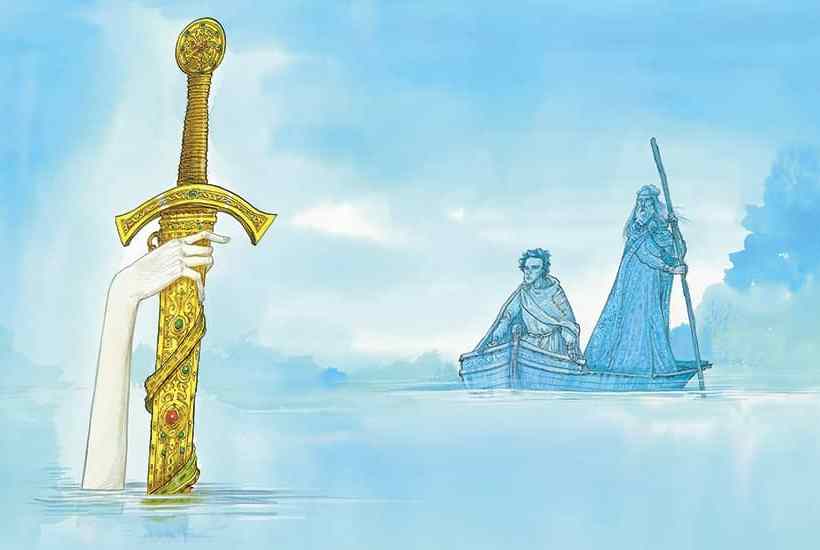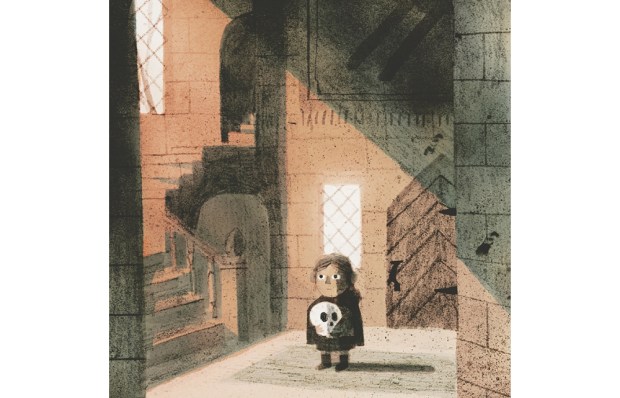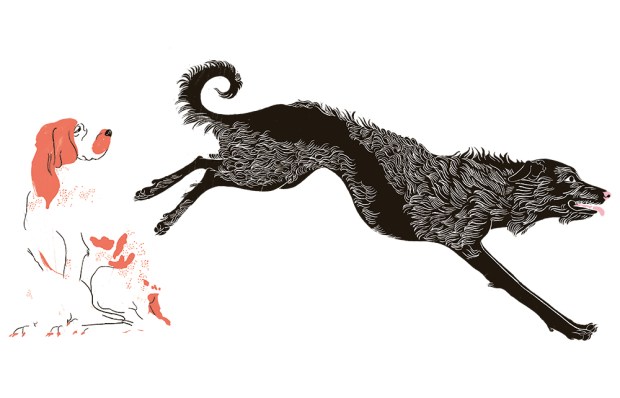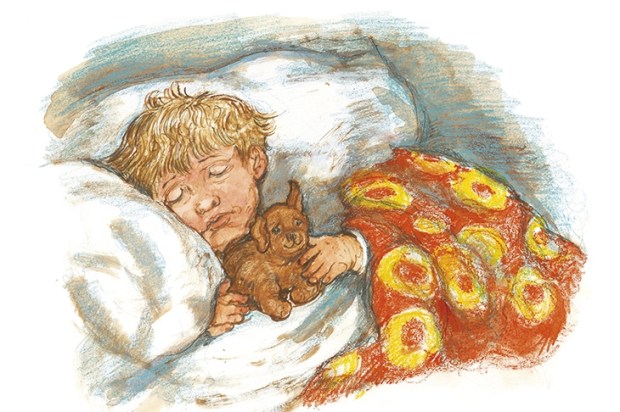She’s done it again: J.K. Rowling has written a captivating children’s book. The Christmas Pig(Little Brown, £20) is about a toy pig, Dur Pig (DP for short), a boy called Jack and what happens when DP gets chucked out of a car and is replaced with an unwelcome Christmas Pig. It’s also about how horrible divorce is for children, what happens to lost things and how the least prepossessing creatures can show courage and self-sacrifice. It’s also a rattling adventure story about Jack and the Christmas Pig’s progress across the Land of the Lost, pursued by a scary ogre called the Loser. It takes place on Christmas Eve, ‘a night for miracles and lost causes’, and is much more Christmassy than any of the festive books about Santa’s lost elves and underperforming reindeer which bring out the Herod in so many of us.
It’s customary nowadays to categorise children’s books by age range, but it’s hard to know how you’d bracket Fish for Supper by M.B. Goffstein, a welcome reprint from The New York Review Children’s Collection (£13.99) of her 1976 story about a grandmother who gets up at five in the morning to go fishing, catches ‘sunfish, crappies, perch and sometimes a big northern pike’ and then goes home to clean the fish, take fresh rolls from the oven and put on hot water for tea. Finally, she ‘sat down and ate very carefully, taking care not to choke on a bone’. It’s simplicity itself, both the spare prose and the spare line drawings, and is brilliant.
One picture book that made me laugh is Bad Apple by Hew Lewis Jones and Ben Sanders (Thames & Hudson, £11.99) about ‘a nasty piece of fruit’ who torments everyone, but makes a mistake when he eats Snake’s cake. Ben Sanders’s bold illustrations are naive and subversive.
Julia Donaldson and Axel Scheffler of Gruffalo fame have a nice line in sturdy pop-up books. The latest of the ‘Tales from Acorn Wood’ series, Squirrel’s Snowman(Macmillan, £6.99) is about, well, a squirrel who makes a snowman. Lovely.
Francesca Simon, whose ‘Horrid Henry’ series mercilessly sends up middle-class parenthood, has gone all Norse of late. Two Terrible Vikings (Faber, £6.99) is about Hack and Whack, twins who gladden their parents by being very, very bad and thus very Viking. The cartoonish drawings by Steve Moy give the gist. I know one bad boy who likes it very much.
A perfect collection of fairy stories is always welcome and The Provensen Book of Fairy Tales by Alice Provensen (The New York Review Children’s Collection, £19.99) is one of the most delightful. These are literary fairy tales, not folk ones, so think Hans Christian Andersen and Charles Perrault rather than Grimm, with some unexpected treasures. The illustrations are wonderful: vivid colours, bold outlines and zany but clever composition (Martin Provensen, Alice’s husband, worked for Disney).
The young illustrator William Grill’s Bandoola, The Great Elephant Rescue (Flying Eye Books, £15.99) is a large, slim book, the perfect format for his simple, graceful illustrations. It’s a true second world war story about an elephant, Bandoola, who, under the direction of his keeper Po Toke and the veteran known as Elephant Bill, led a group of refugees escaping the invading Japanese, plus 53 other elephants, from the Burmese jungle to northern India. Shades of Hannibal.
Chris Riddell is an extraordinarily prolific artist, whose line is always exquisite, whether he’s illustrating The Hitchhiker’s Guide to the Galaxy or Through the Looking Glass (Macmillan, £25). He’s an admirer of Tenniel and, like Tenniel’s, his White Knight has shades of Don Quixote. If you’re a Riddell fan, this edition has his trademark hallucinogenic detail and much humour besides.
He has also illustrated the stories of the Round Table in Kevin Crossley-Holland’s Arthur, The Always King (Walker Books, £20). Crossley-Holland has a spirited take on the tales and Riddell’s illustrations are both slightly creepy (especially Lancelot) and beautifully drawn. Gawain and the Green Knight is particularly fine.
The writer who made the Romano-British world her own is Rosemary Sutcliff, who brought to life those times when the Romans were still in Britain, the Saxons were advancing and an orderly world was overturned. Slightly Foxed has a terrific edition of the very loosely connected series (£19.99 or £133 for the set of seven), beginning with The Eagle of the Ninth, The Silver Branch and Frontier Wolf. It has now published The Shield Ring, with evocative illustrations by C. Walter Hodges, and Sword Song (£17 each), which take us into Viking Britain and Norman England. For anyone led astray by rubbish fantasy online series set in the Dark Ages, these would be a good antidote.
The publisher Barrington Stokes specialises in clear format short books suitable for dyslexics. But it’s not only dyslexics who will enjoy Welcome to Trash Land by Steve Cole (£6.99). Set in a dump for spent electronics in Ghana, where our dead devices are picked over by underpaid children, it shows how, in hellish circumstances, a spirited boy can turn unexpected events to good account. And Gill Lewis’s Swan Song (£6.99) is about a boy who’s been excluded from school and finds another world when he goes to live with his grandfather by the sea, where he meets a swan that he saves and that saves him.
World Book Day was in March, but if you can still find a copy of Katherine Rundell’s Skysteppers (Bloomsbury, £1) written for it, do: it’s a wonderful adventure story set among the child roof-dwellers of Paris which sits easily besides her brilliant Rooftoppers.
Some of the most interesting contemporary children’s writers are African. Efua Treore’s Children of the Sands (Chicken House, £7.99) is a riveting read about a girl sent from Lagos, where her parents have split up, to stay with her grandmother in the middle of nowhere — a village where quicksands take her to another world in which fantastical things happen in a hidden lake.
Hide and Seek by Robin Scott-Elliot (Everything with Words, £7.99) is a cracking adventure story about a young girl who joins the Resistance after the Nazis take her parents and her brother, with other Jews, from Paris, and is trained as a spy in England. Parts are based on true accounts.
Jonathan Stroud’s ghosthunter series, ‘Lockwood & Co’, is a wonderful read. Now he’s come up with new protagonists for The Outlaws Scarlett & Browne (Walker Books, £7.99). A crack-shot bank-robber called Scarlett and her sidekick, Albert Browne, are being pursued across England by sinister forces who want to exploit Albert’s eerie talents. The only flaw is that Scarlett can only function after a good meditation session. Mindfulness? In an adventure story? Really?
I’ve left the best until last. Alan Garner’s Treacle Walker (4th Estate, £10) is about a rag-and-bone man who isn’t what he seems — a man who emerges occasionally from a marsh— and an unlovely boy called Joe, who’s obsessed with comics and sees things he shouldn’t. God knows what age group it’s written for, but it’s utterly compelling.
Got something to add? Join the discussion and comment below.
Get 10 issues for just $10
Subscribe to The Spectator Australia today for the next 10 magazine issues, plus full online access, for just $10.
You might disagree with half of it, but you’ll enjoy reading all of it. Try your first month for free, then just $2 a week for the remainder of your first year.














Comments
Don't miss out
Join the conversation with other Spectator Australia readers. Subscribe to leave a comment.
SUBSCRIBEAlready a subscriber? Log in